The Vital Role of Spatial Awareness in Daily Life and Learning
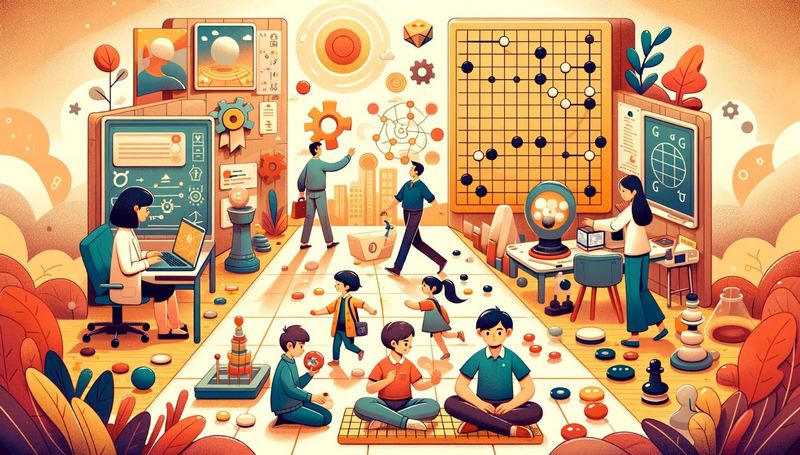

Spatial awareness is crucial for navigating environments and excelling in STEM (Science, Technology, Engineering, Mathematics), where it enhances problem-solving and analytical skills. This article discusses the importance of spatial awareness in STEM fields and how activities like playing Go (Weiqi, Baduk) can improve it. It helps to understand complex concepts and foster reasoning abilities, demonstrating the value of developing this skill for educational and professional success in these fields.
Understanding Spatial Awareness
Spatial Awareness involves grasping spatial perception, which is crucial for interpreting our environment and object interrelations. Spatial visualization abilities include mental animation—manipulating objects in one’s mind—and mental folding, which involves bending or rotating objects mentally. These skills are pivotal for tasks ranging from navigation to complex problem-solving, impacting daily activities and specialized fields alike. Spatial awareness can be developed through interaction with the environment and enhanced practice and targeted exercises. These exercises include:
- Engaging in sports or other physical activities that require spatial judgment, such as basketball, tennis or football.
- Playing video games like Tetris or solving puzzles that challenge spatial reasoning.
- Practicing drawing or modeling, which involves translating 3D objects into 2D surfaces or vice versa.
These activities not only improve spatial perception but they also contribute to cognitive development by supporting skills in mathematics, science, and technology.
The Development of Spatial Awareness
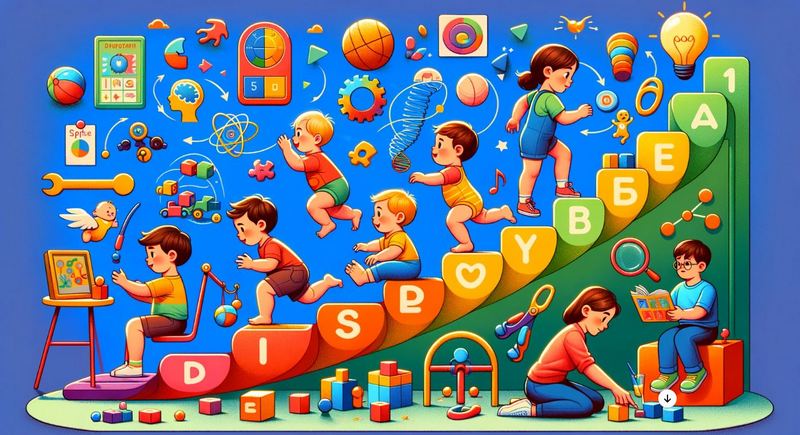
Spatial awareness, the ability to understand our position in space relative to objects around us, starts to develop in infancy. This crucial skill evolves through the integration of the proprioceptive sense, the vestibular system, and visual perception.
- Proprioceptive Sense: Involves the body’s ability to perceive its position in space, and contributes to motor control and posture.
- Vestibular System: Located in the inner ear, it helps with balance and spatial orientation. It informs us about motion, head position, and spatial navigation.
- Visual Perception: The ability to interpret and make sense of visual information from the environment plays a key role in understanding spatial relationships.
Activities like crawling, walking, and playing with objects enhance these sensory experiences, promoting the development of spatial awareness. Early engagement in activities that require spatial reasoning, such as block play, puzzles, and exploring environments, further supports this development.
Key abilities underpinning spatial visualization are:
- Mental Animation: The capacity to predict the motion of objects in the mind.
- Mental Folding: The ability to foresee how a flat surface can be folded into a three-dimensional object.
These abilities are essential for various disciplines and activities, ranging from architecture and engineering, to sports and driving. Developing spatial awareness can enhance cognitive functions, improve problem-solving skills, and boost navigational abilities. Strategies for improving spatial awareness include engaging in activities that challenge spatial reasoning, practicing visualization techniques, and playing spatially demanding games.
By nurturing spatial awareness, individuals can significantly enhance their understanding of and interaction with the physical world. This leads to improved performance in both academic and everyday tasks.
Activities to Boost Spatial Awareness
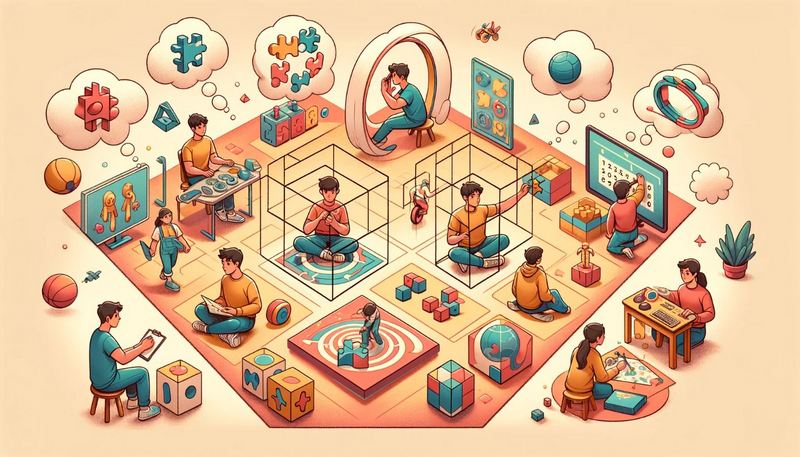
Spatial awareness, an essential cognitive ability, can be enhanced through targeted activities and exercises. These activities help us to understand and interact with our environment more effectively, aiding in navigation, object manipulation, and spatial reasoning.
Key activities include:
- Mental Rotations: Practice mentally rotating objects to understand their structure from various angles.
- Visualization: Visualize objects from different perspectives to improve mental mapping skills.
- Organizing Spaces: Arrange and organize both physical and virtual spaces to better understand spatial relationships.
Effective games and exercises:
- Puzzle Games: Engage in puzzle-solving, like jigsaw puzzles or tangrams, to enhance figure-ground perception.
- Building Blocks: Use building blocks or LEGO to create structures, focusing on symmetry and balance.
- Mapping Routes: Draw maps or plan routes in familiar and unfamiliar environments to improve navigational skills.
- Eye-Hand Coordination Activities: Participate in sports or video games that require precise timing and spatial judgment.
These activities not only help to improve spatial awareness but also contribute to better problem-solving skills, memory and cognitive flexibility. With regular practice significant improvements can be made in both academic and everyday life scenarios, making spatial awareness a valuable skill that everyone can develop at any age.
Enhancing Spatial Awareness with the Game of Go
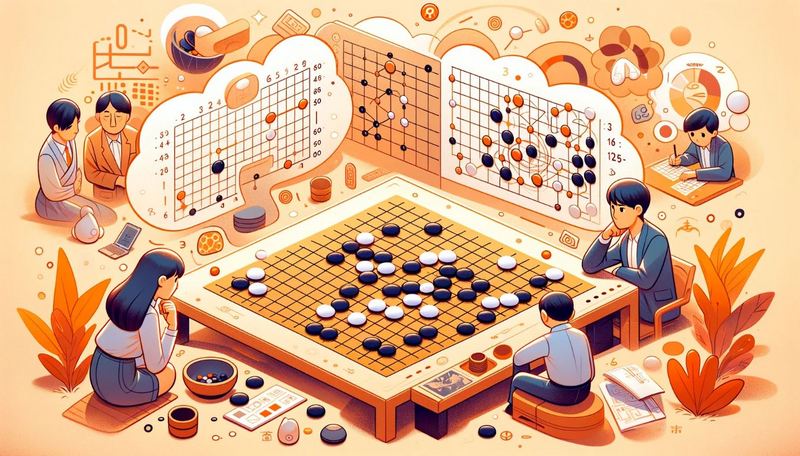
The ancient game of Go is not just a test of strategic might but also a powerful tool for improving spatial awareness. The complex playfield of the game, which requires players to visualize their moves ahead and anticipate changes, mirrors the complex spatial reasoning tasks that are encountered in real-world scenarios.
Key aspects include:
- Strategic Depth: Players must assess the positions, project possible board states, and understand the complex interplay between stones, enhancing predictive and strategic thinking.
- Visualization: The requirement to visualize potential moves in the mind’s eye and their impact on the board promotes advanced spatial visualization skills.
- Spatial Planning: Deciding where to place the stones to control the territory involves intricate planning and foresight, akin to architectural or urban planning on a smaller scale.
Playing Go cultivates a refined sense of spatial awareness, making it an invaluable exercise for anyone seeking to improve their spatial reasoning, planning abilities, and strategic thinking.
Discover More about the Game of Go:
To delve deeper into the world of Go and harness its potential to improve your spatial awareness and strategic thinking, explore Go Magic, an online platform dedicated to everything Go. With GoMagic, you can:
- Learn the Rules of Go: Start your journey by understanding the foundational rules of this fascinating game at How to Play Go – Rules.
- Solve Go Problems: Challenge your skills and raise your game by solving Go quizzes tailored for players of all levels at Skill Tree.
- Access Video Courses: Whether you’re a beginner or an experienced Go player, discover our video courses with interactive elements designed to enhance your understanding and strategic approach. Our courses are categorized into different categories to help you find the perfect fit for your level of play. You can find them at Course Categories.
Embrace the opportunity to enhance your cognitive skills while enjoying one of the most ancient strategic games in the world. Visit Go Magic today and start your journey towards becoming a more spatially aware and strategically minded individual.
Spatial Awareness in Education
Spatial skills play a pivotal role in the development of mathematics and reading comprehension, serving as a foundation for academic success. These skills allow students to understand complex spatial relationships and visualize different scenarios, both of which are critical for solving mathematical problems and understanding geometric principles as well as navigating through complex texts.
- Mathematics: Spatial awareness is an integral part of geometry, measurement, and algebra, as it helps withunderstanding shapes, patterns, spatial relationships, and problem-solving. These are all core components of math curricula.
- Reading Comprehension: Spatial skills are helpful for organizing information, comprehending diagrams and charts, and following directions, which enhance reading comprehension and help one learn from textual content.
- Academic Success: Studies suggest a strong correlation between spatial reasoning abilities and achievements in STEM fields. Enhancing spatial skills can lead to better academic performance and future career success in these areas.
Educators can support the development of spatial skills through activities that encourage visualization, object manipulation, and spatial reasoning. Integrating these activities into daily learning can significantly impact students’ understanding and retention of mathematical concepts and improve their reading comprehension skills.
Key Takeaways:
- Spatial awareness is essential for navigation, STEM success, and engaging in strategic games like Go.
- Developing spatial skills through varied activities enhances problem-solving and analytical capabilities.
- Playing Go offers a unique, enjoyable pathway to improve spatial awareness, strategic thinking, and cognitive flexibility.
- Incorporating spatial reasoning in education enriches learning and comprehension across disciplines.
Conclusion
Emphasizing the significance of nurturing spatial awareness through varied activities, the article encourages readers to incorporate spatial reasoning exercises into their daily routines. Playing strategic games like Go is presented both as a fun and educational way to improve cognitive skills, demonstrating the game’s potential to contribute to cognitive development and spatial awareness in a compelling manner.
This outline is designed to comprehensively cover the topic, offering readers insights into spatial awareness, its development, importance, and enhancement through engaging activities, such as the game of Go. The article aims to be informative, entertaining, and practical, providing valuable information and tips for readers interested in boosting their spatial reasoning skills.
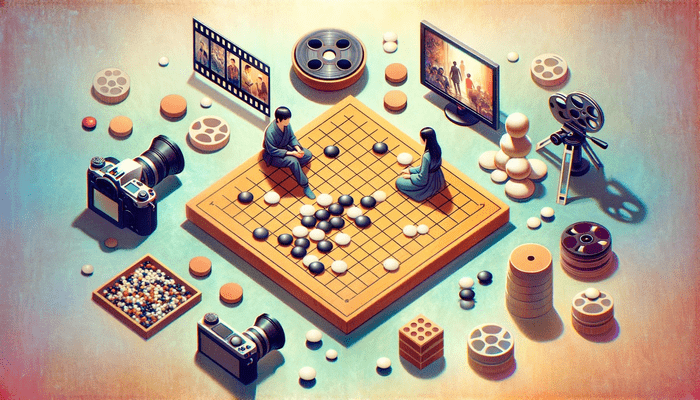
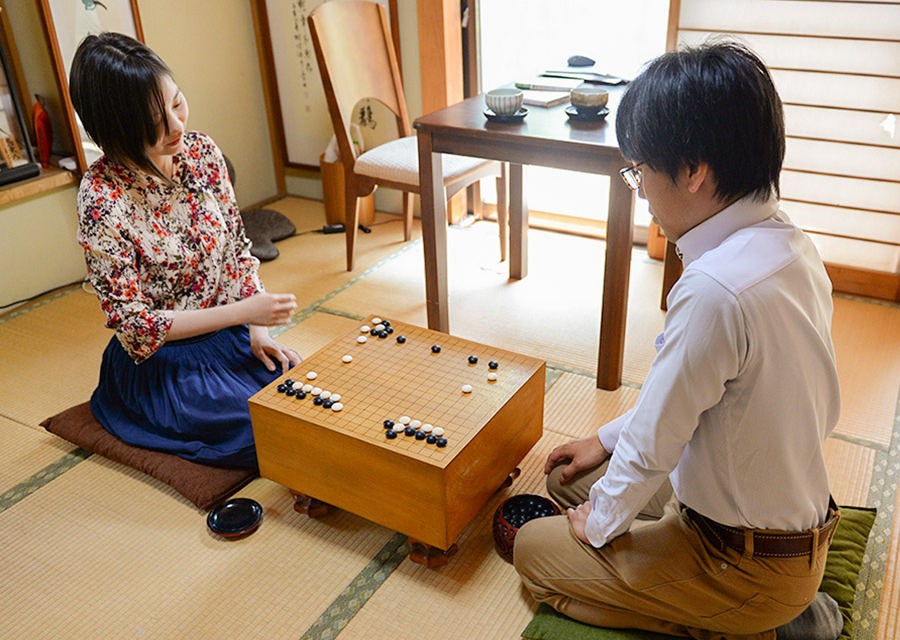

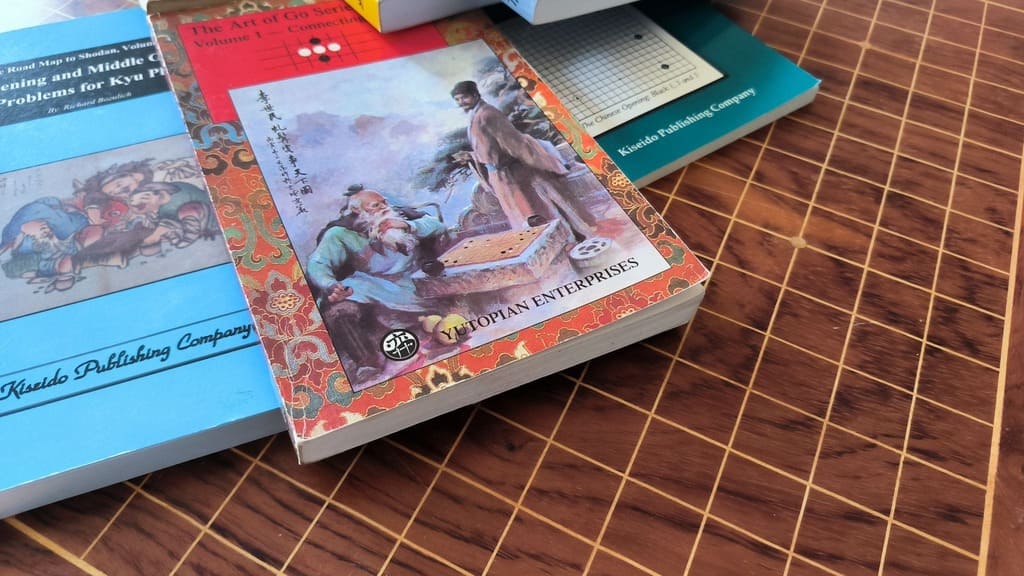
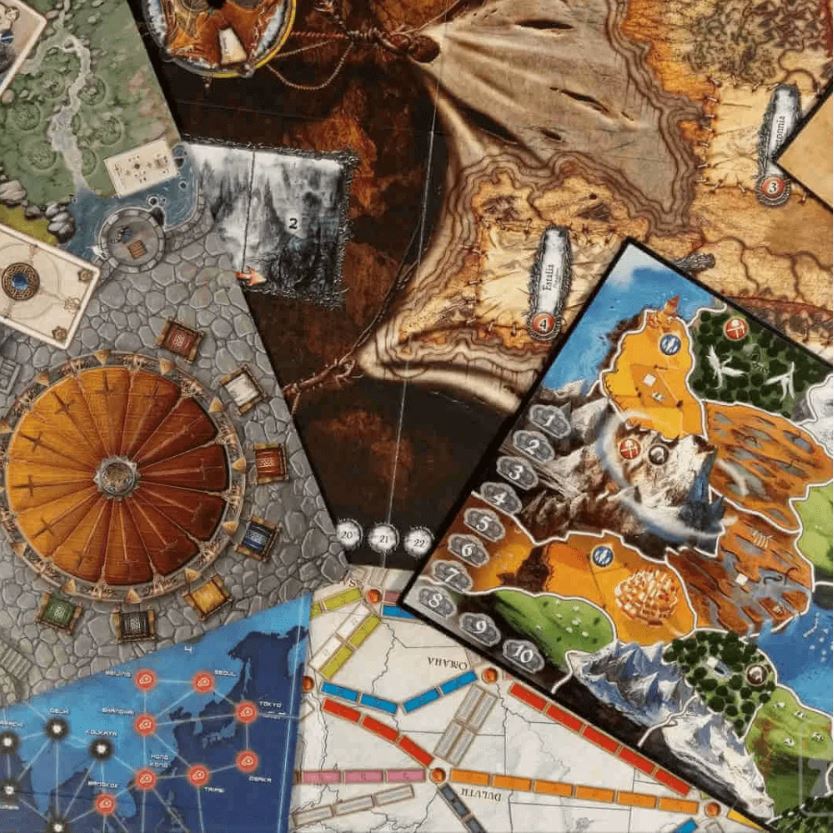
Leave a comment